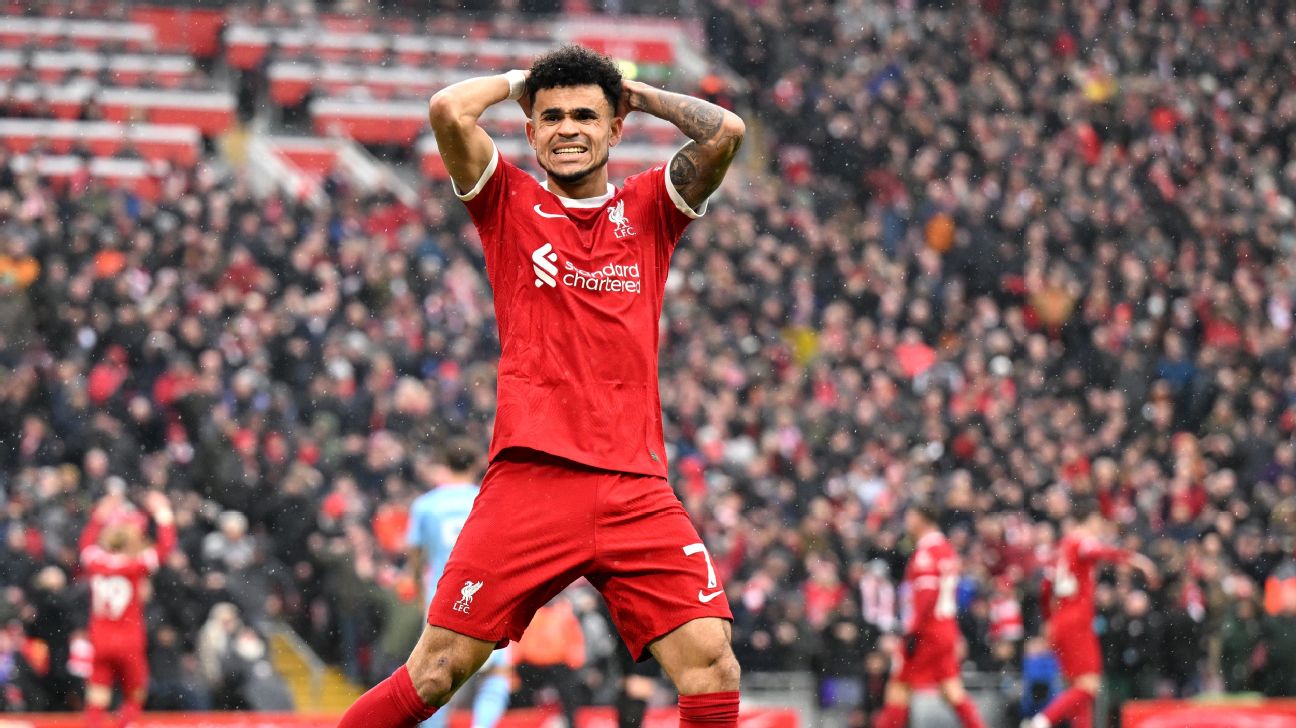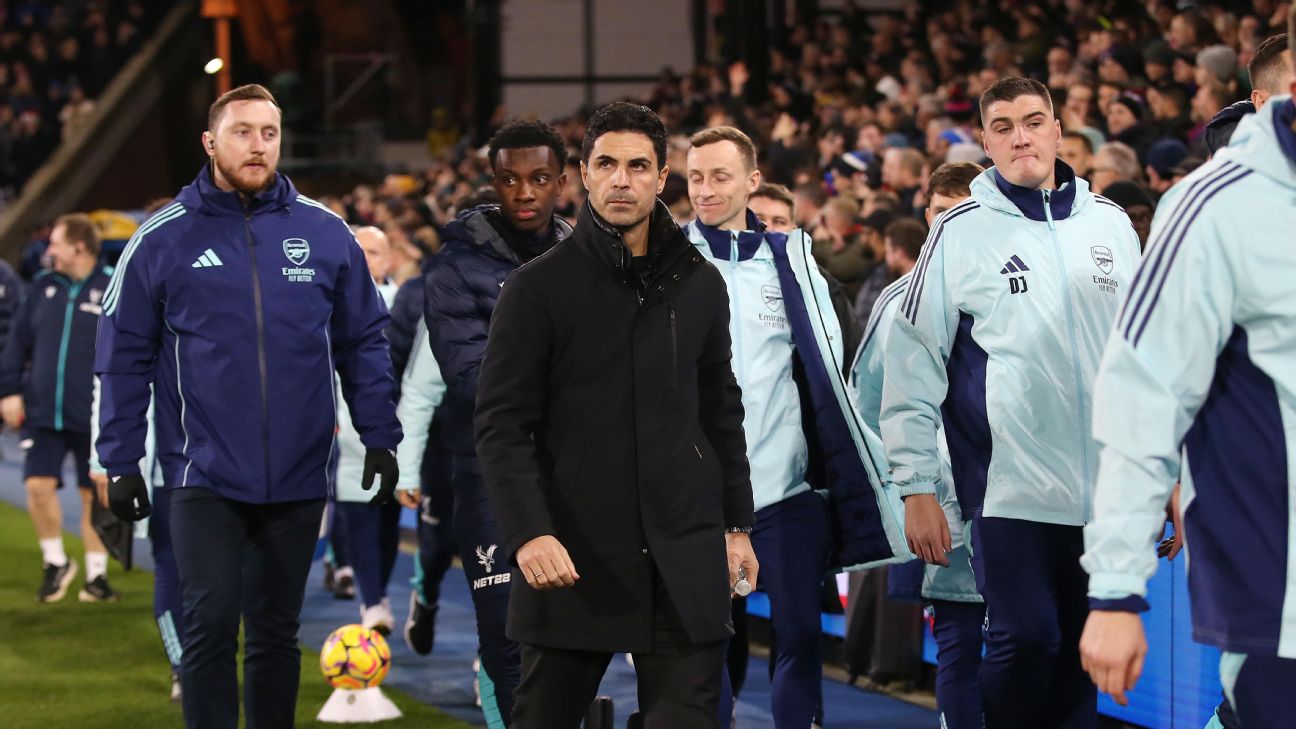With 10 games remaining in the season and just one point separating first- and third-place in the Premier League, these are the factors that will determine the winner of the title, in descending order of importance:
1) Luck
2) Strength of schedule
3) Quality of performance
We can’t predict the first one: injuries, finishing, refereeing decisions — all that stuff is too random. We can’t really even be that confident in our prediction for the third one given how close the title contenders have been to each other.
But the second one on that list? Yeah, we can quantify that — and on the aggregate, Liverpool wins out.
A simple estimate of remaining schedule strength would be the average non-penalty expected-goal differential of each team’s final 10 opponents, adjusted for the location of the match. Per Stats Perform’s expected-goal (xG) model, here’s how the teams stack up:
• Liverpool’s opponents: minus-0.08 per game
• Arsenal’s opponents: minus-0.02
• Manchester City’s opponents: minus-0.01
Except, we don’t experience the season as a 10-game block. It’s week after week after week, and the remaining strength of schedule shifts with each game that’s played. Rather than just conclude that Liverpool have a significantly easier schedule than Arsenal and Man City and leave you with that, we’re going to go a step further.
Let’s rank the final 30 fixtures of the Premier League season, in order of how difficult they are, measured by a team’s non-penalty xG differential at home or on the road. This will serve as our guide through what promises to be a thrilling and chaotic final few months in the Premier League.
1. Arsenal at Manchester City (March 31)
No shocker here.
City’s non-penalty xG differential at home is plus-1.1 per game. In a vacuum, most of us would probably still pick City as the best team of the three title-racers. And Arsenal are playing them in Manchester. You could argue that their trip to Anfield was Arsenal’s hardest fixture of the season, but this would — at worst — be the second toughest individual match on their schedule.
Twenty-eight games in, though, Arsenal have been the best team in the league. They’ve scored five more goals than anybody else, and they’ve allowed two fewer. It’s backed up by their non-penalty xG differential, too:
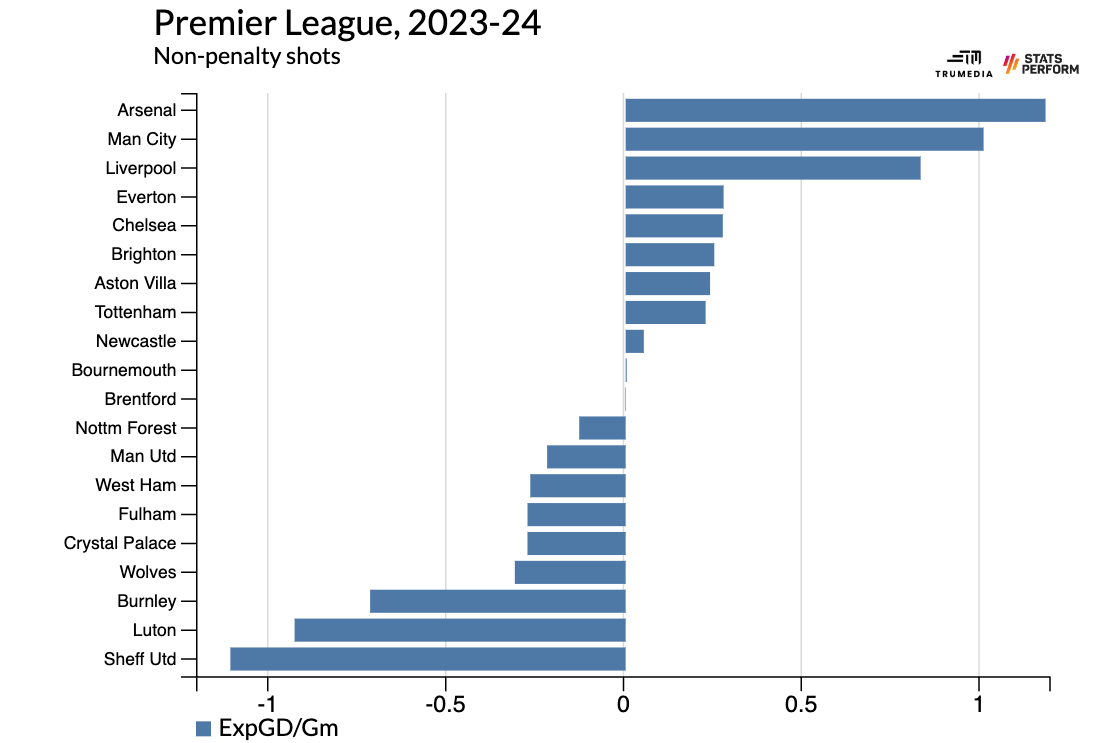
Despite that, Arsenal will be underdogs in this match. City and Liverpool, meanwhile, will be favorites in every game they play from now until the end of the season.
2. Manchester City vs. Arsenal (March 31)
If you’re wondering how home-field advantage works, take a look at this chart, which is the same one from the previous section, but only accounting for road matches:
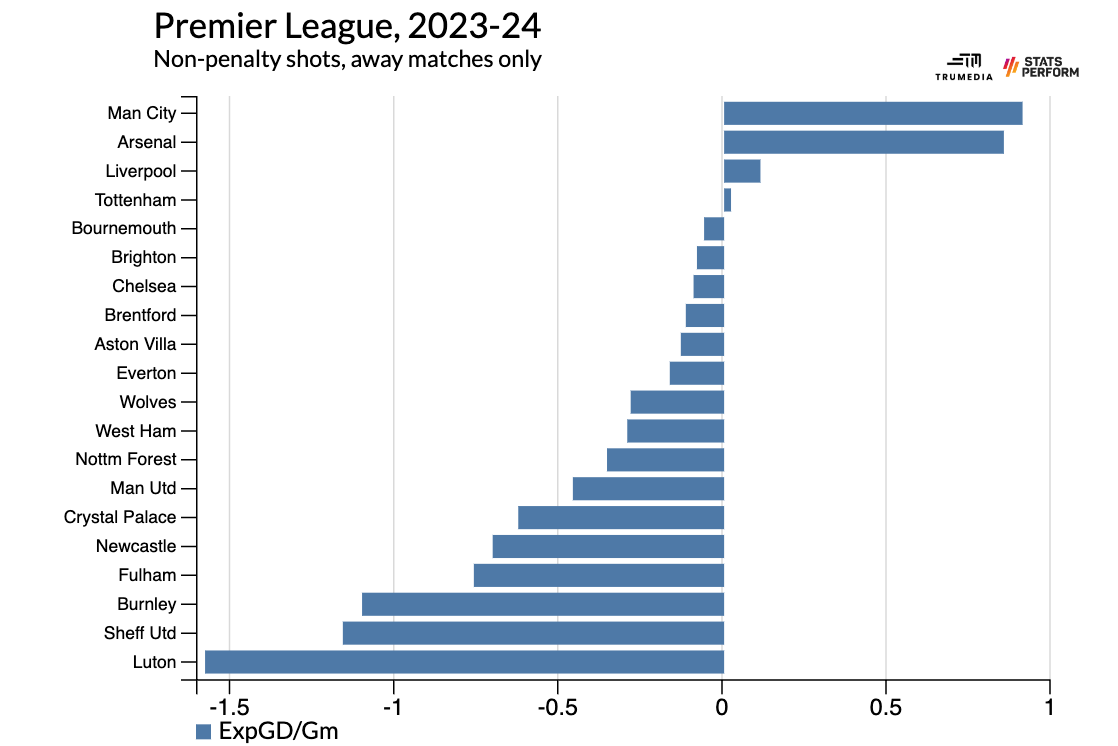
Pretty much every team in the league is negative away from home. Tottenham Hotspur are basically even, Liverpool are slightly positive and then Arsenal and Manchester City have been elite-but-worse-than-their-average on the road.
Perhaps the largest overarching story of this season is that there are essentially three separate leagues, in terms of underlying performance. There’s the top three, then I think the gap between fourth and third is bigger than the gap between fourth and 17th. And then you’ve got the bottom three.
Thanks to that — and Arsenal’s excellence, no matter where they play — Manchester City’s hardest remaining match is one they play at home.
3. Liverpool at Everton (date TBD)
Here’s the third version of that xG table, including only matches played at home:
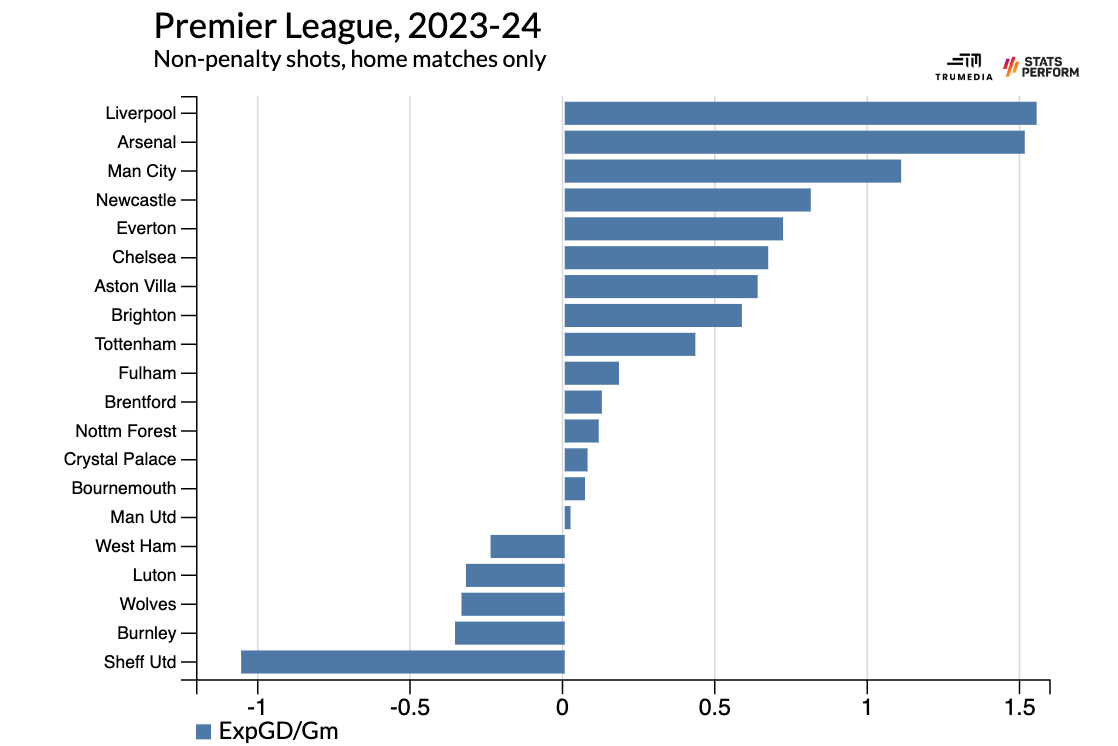
The Anfield Effect is real. By xG differential alone, Liverpool have been a borderline Europa League team on the road and then an all-time great side at home. However, the Goodison Park Effect might be real, too.
The perception of Everton’s season has been screwy for obvious reasons: administrators first subtracted 10 points from their total, then added four points back and now might re-retract some more depending on what gets decided in court. But in terms of what they’ve done on the field, they’re sitting somewhere in that fourth-to-17th morass and could perform anywhere in that range on any given weekend.
To add to the confusion, their results have actually been better on the road this season, but their performances have been way better at Goodison Park. Outside of the top three and Newcastle, Everton under Sean Dyche have the best home xG differential of any team in the league.
4. Liverpool at Aston Villa (May 11)
After taking down Arsenal and Manchester City in consecutive matches at Villa Park in December, can Aston Villa’s Unai Emery & Co. complete the trifecta against Liverpool in May?
More specifically, will their defense be able to hold up? This graphic shows the rolling five-game average for Aston Villa’s expected xG conceded per game. In other words, it plots Villa’s average for games one through five, two through six and all the way though games 24 through 28:
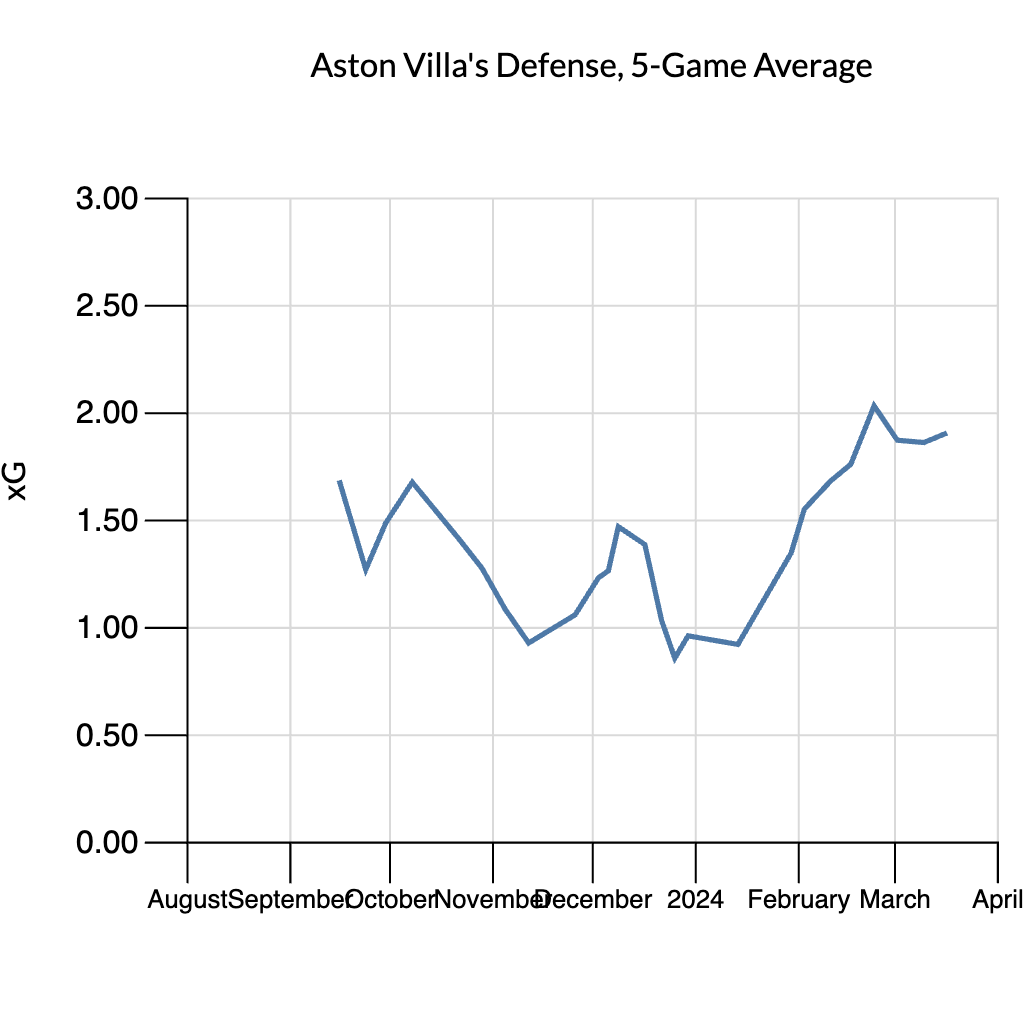
As you can see, the defense has collapsed since the turn of the year — likely due to starting center backs Pau Torres and Ezri Konsa both missing significant amounts of time. However, they both should be back in the lineup by the time this match rolls around May 11.
T-5. Arsenal at Brighton (April 6) | Manchester City at Brighton (date TBD)
Brighton haven’t been as good as they were last season — and well, how could they be? They lost their entire midfield, while potential breakout candidate Julio Enciso has barely played, stars Kaoru Mitoma and Pervis Estupiñán have missed significant time and teenage sensation Evan Ferguson hasn’t been productive up top.
Even with the decline, though, they’ve still been formidable at home: just one Premier League loss, 3-1 to West Ham back in August.
T-7. Arsenal at Tottenham (April 27) | Manchester City at Tottenham (date TBD)
Spurs already drew with both Arsenal and Manchester City earlier this season — and both games were away from home. But as we’ve already touched on, Spurs have been one of the better road teams in the league. They’ve still been better at home than on the road, but not by as big of a degree as you might expect. Their road xG differential ranks fourth in the league, while they’re just ninth at home.
Along with Brighton and Wolves, Spurs are the only other team who still play all three teams in the title race. And unlike Brighton and Wolves, they’ll likely be battling it out for a top-four spot all the way through the end of the season.
One real thing that happens toward the end of the season is teams not in relegation places and not in the mix for European qualification do tend to see a decline in performance since they don’t have as much riding on their matches. That won’t be the case for Spurs, but it might be true for Bright and Wolves. So, not only will Tottenham be playing for fourth from here on out, they’ll also have a pretty big influence on who actually wins the league.
T-9. Liverpool at Fulham (April 20) | Manchester City at Fulham (May 11)
They’ve already taken down Arsenal at Craven Cottage — can they muck things up for City and Liverpool, too? In fact, the Fulham match might’ve been Arsenal’s worst performance of the year — red circles are shots, green ones are goals and the larger the circle, the higher its xG:
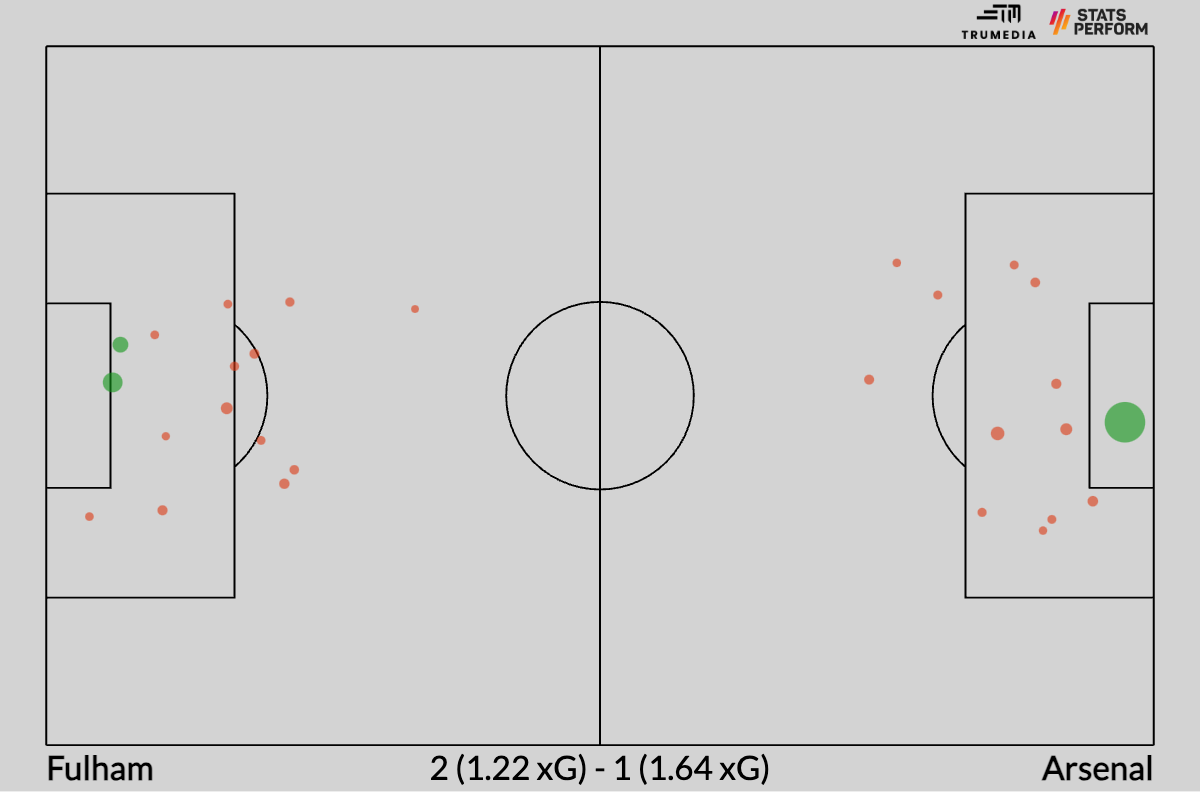
While he didn’t play in that match, the 22-year-old Brazilian striker Rodrigo Muniz has come out of nowhere to super-charge Fulham’s attack. For much of the year, Fulham looked like a team that replaced one of the best strikers in the league, Aleksandar Mitrovic, with, well, no one.
But since the turn of the new year, Muniz is tied with Ollie Watkins for the league lead in non-penalty goals (seven), and he’s done it in nearly 200 fewer minutes. If he continues to play at this level, then Fulham will be a completely different proposition to the team Liverpool and City hosted earlier this season.
11. Manchester City at Nottingham Forest (April 27)
Although their results have been horrible in 2024 — five points, joint-fewest with Everton and Sheffield United — Nottingham Forest’s performances have been deceivingly decent this year. Here’s how they stack up by non-penalty xG difference since Jan. 1:
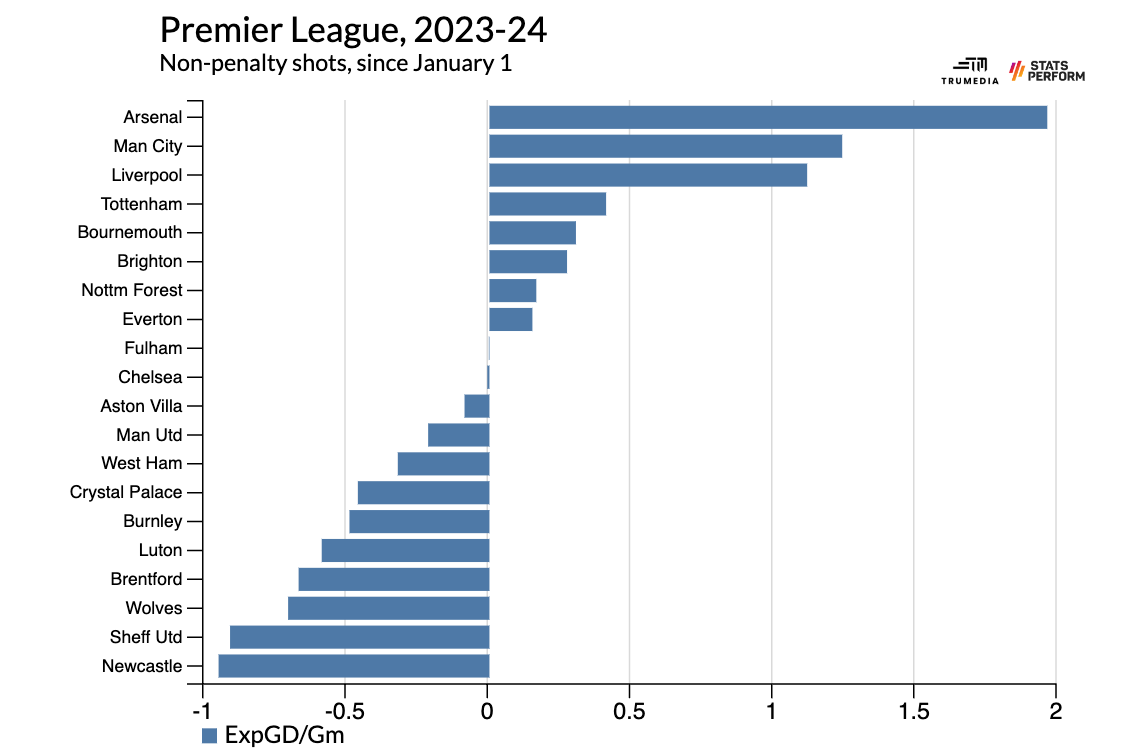
If this table represents the level of performance we should expect for the rest of the season, then it doesn’t really matter because Arsenal are going to walk away with this thing, but it would also mean that City’s match at the City Ground is trickier than it looks on paper.
12. Manchester City at Crystal Palace (April 6)
[Builds a neon sign saying, “SMALL SAMPLE SIZE WARNING” that is so big and bright that it lowers the average sleep time of the greater Los Angeles area by 45 minutes]
Crystal Palace’s per game xG differential under old manager Roy Hodgson: minus-0.32.
Crystal Palace’s per game xG differential under new manager Oliver Glasner: plus-0.6.
This is mostly pointless because Palace have played three games under Glasner: home matches against Burnley and Luton, sandwiched around a trip to Tottenham. If you managed Crystal Palace at home against Burnley and Luton, their numbers would probably look pretty good.
But as we get further into this list, the more we’re at risk of dislocating our shoulders as we grasp deeper for straws. The point is: There’s at least a decent chance that Palace are a somewhat better team now than they were under their previous coach.
T-13. Liverpool at Manchester United (April 7) | Arsenal at Manchester United (May 11)
I don’t know what to make of this fixture. Do I really think that it’s an easier game than Fulham or Forest or Palace? Maybe not the latter two, but Man United have only won the ninth-most points at home of any team in the league this season, and that’s without playing the two teams tied on points at the top of the table. They’ve scored 18 non-penalty goals at Old Trafford … And conceded 19. Yes, they did just beat Liverpool in the FA Cup quarterfinals at home, but before that, they conceded 23 shots to Everton in a win and lost to Fulham.
My general thesis on Man United is that, on average, they are a league-average team. But since their roster and tactics prevent them from ever controlling a match, and since they do have more talent than your typical league-average team, they’re much more volatile than your average league-average team. Sometimes Alejandro Garnacho and Bruno Fernandes and Marcus Rashford can turn a handful of their possessions into high-quality chances and sometimes their defenders or André Onana play well, and bam, you’ve got a win and a decent overall performance. Other times, they can’t affect the game at all, and they have to hang on for dear life.
I’d be pretty confident in wagering that both Arsenal and Liverpool have at least 65% of the possession in these matches and that they outshoot United by at least 10 shots. I’m less confident in whether the shots go in and whether all the dominance converts into quality-chance-creation dominance.
More broadly, though, it looks like May 11 might be the most pivotal single day on the schedule from here on out. Arsenal go to United, City go to Fulham and Liverpool go to Aston Villa. You don’t want to miss this upcoming Sunday, of course, but don’t be surprised if the second Saturday in May sees a significant shuffle in the standings.
15. Liverpool vs. Tottenham (May 4)
After what happened last time these two teams played, If there’s any kind of VAR-related controversy in this match, I would highly recommend renouncing all materials goods, throwing your phone into the nearest sewer and moving to the nearest nature preserve.
16. Arsenal vs. Bournemouth (May 4)
Bournemouth have been playing most of this season without what I would identify as an “actual defensive midfielder.” Tyler Adams, who was signed from Leeds United over the summer and is an actual defensive midfielder, is finally back from injury. His ability to win possession and provide competent ball progression from the deepest midfield slot is rare among teams that aren’t part of the so-called “Big Six.” And we saw Leeds fall apart last season without it. What might happen to Bournemouth with it?
Even if Adams improves the Cherries, though, Arsenal still shouldn’t drop any points here. Frankly, if any of these teams drop any points at home from here on out, it’ll probably end up costing them the title.
17. Liverpool vs. Brighton (March 31)
Let us rank the likelihood of the outcomes this Sunday, based on the implied odds from ESPN Bet:
1) Liverpool beat Brighton: 66%
2) City beat Arsenal: 51%
3) City draw Arsenal: 25%
4) Arsenal beat City: 24%
5) Liverpool draw Brighton: 19%
6) Brighton beat Liverpool: 15%
The most likely outcome from this upcoming weekend, then: Liverpool are in first place, with nine games left to go.
18. Arsenal vs. Chelsea (date TBD)
Yes, it’s Chelsea. And yes, they did draw with Man City at the Emirates. But against Liverpool and Man City, on the road, Chelsea did the following:
• non-penalty xG for: 2.02
• non-penalty xG against: 4.81
• touches in penalty box for: 26
• touches in penalty box allowed: 126
Someone is going to step on rake in one of these bottom 10 or 15 games because soccer is random like that, but much like every other match from here on out: Arsenal should cruise in this one.
T-19. Manchester City vs. Aston Villa (April 3) | Arsenal vs. Aston Villa (April 14)
Yes, Villa beat both of these teams back in December, so neither match is a sure thing. But Emery’s side is sporting a minus-0.13 xG differential in road games this season. That’s the same mark as Nottingham Forest’s full-season number. And they’re currently in 18th.
21. Arsenal vs. Everton (May 19)
If any of these teams are still in the title race come the final day of the season, it’s really hard to imagine any of them losing. But Everton, especially if they’re still in a relegation battle, should be a tougher out than either Wolves (at Anfield) and West Ham (at the Etihad), neither of whom will have anything to play for at that point in the season.
22. Liverpool at West Ham (April 27)
This certainly feels like it should be higher on the list, but West Ham just haven’t been very good this season. They’re 14th in the league by overall non-penalty xG differential, and their home and road marks aren’t significantly different.
The worry for Liverpool here would be that March has been West Ham’s best month so far: 11 goals for, five against across games away to Everton, away to Freiburg, then a trio of home matches with Burnley, Freiburg and Aston Villa. Maybe they’re cresting at the right time.
T-23. Manchester City vs. Wolves (May 4) | Liverpool vs. Wolves (May 19)
It’s impressive that Wolves lost their theoretical star player, Rúben Neves, over the summer and then their theoretical star manager, Julen Lopetegui, on the eve of the season, but still managed to stabilize and comfortably avoid relegation. One takeaway: Neves and Lopetegui aren’t as good as conventional wisdom might suggest.
Wolves have performed slightly better on the road than at home this season, but that’s likely because they still haven’t played Liverpool or Man City at home. Their table standing is inflated somewhat by the fact that they still have to play all three title contenders. It’s also inflated by a good deal of finishing over-performance: They’re ninth in the table with an even non-penalty goal differential, while they’re 17th overall with a minus-8.7 xG differential.
25. Manchester City vs. West Ham (May 19)
This happened the last time these two played:
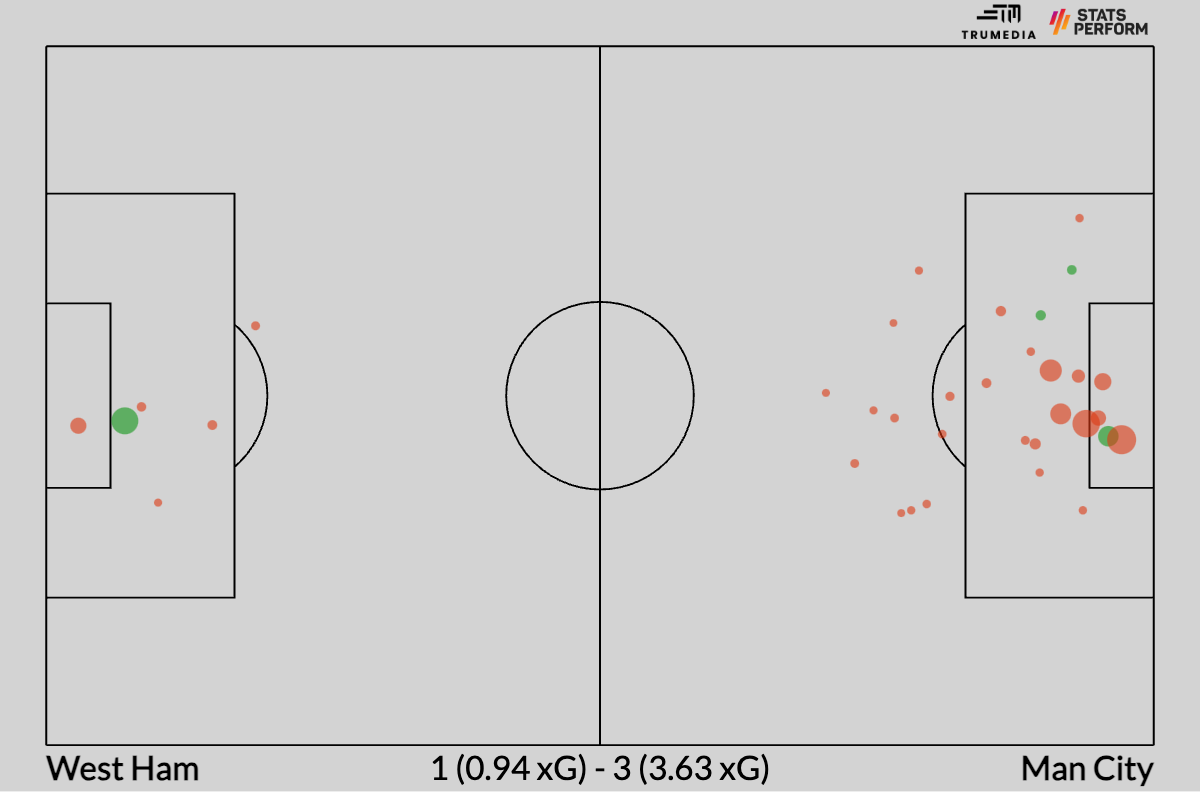
Oh, and Kevin De Bruyne was injured, and that game was in London, not Manchester.
26. Arsenal at Wolves (April 20)
Two of the major drivers behind the success of Wolves this season have been José Sá’s fantastic shot-stopping and Hwang Hee-Chan’s efficiency in front of goal. Hwang has scored with every fourth shot he’s attempted, and Sa has saved more than five goals above average, per Stats Perform’s post-shot xG model.
An upset here likely features a continuation of both unlikely-to-continue trends.
27. Liverpool vs. Crystal Palace (April 14)
On the road, Palace have lost to Arsenal, Brighton, Aston Villa, Tottenham and Newcastle by a combined score of 19-3. Now, they did draw City 2-2, but they also lost to Luton Town 2-1.
28. Liverpool vs. Sheffield United (April 4)
T-29. Arsenal vs. Luton Town (April 3) | Manchester City vs. Luton Town (April 13)
And we’ve finally arrived at the easiest matches on the remaining Premier League schedule for the teams in the title race. If Liverpool, Arsenal or Man City drop points in one of these games against either Sheffield United or Luton Town, you can pretty much say goodbye to their title hopes because these games should be an automatic three points.
